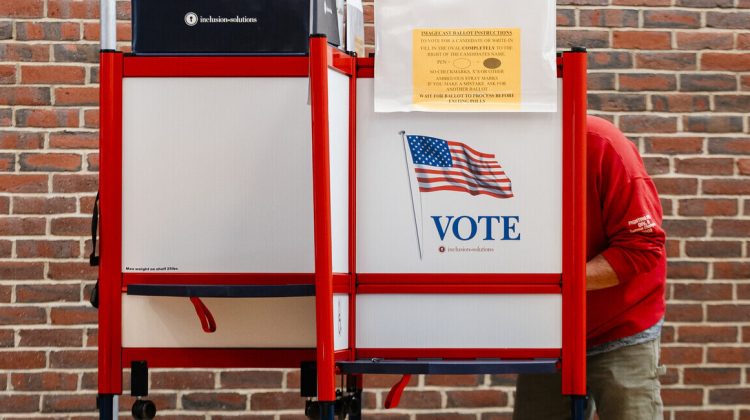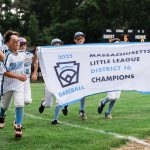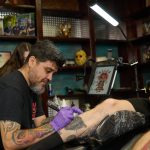Over the last month or so, I have been told time and time again of the pre-pandemic days in Peabody when City Hall buzzed with excitement on election night. Candidates, city staff, and voters would gather under one roof to shake hands, share thoughts, and show support to all who dared to throw their hats in the ring.
And while I know people are telling me these stories in earnest to help me understand what Peabody used to be like, all it did was disappoint me.
Peabody’s municipal election on Nov. 4 was the third Massachusetts election I’ve reported on since moving here in January.
My first was Lynnfield’s June 4 override election, which was on my birthday. Yes, I’m going to milk the fact that I worked an election outside of my coverage area on my birthday, and what about it?
I sat in Lynnfield High’s gym bleachers, typing away on my laptop, minding my own business — and getting briefly distracted by my brother, who chose the wrong time to call and wish me a happy birthday — until just after 8 p.m., when then-Town Clerk Amanda Haggstrom verbally announced the unofficial results. She invited me to take a photo of the data she had on her laptop, and many in attendance nudged me toward who I should interview.
I’m good at my job, but I was entering unknown territory that evening. I had never stepped foot in Lynnfield, and I didn’t have strong relationships yet with any of the key players.
Without the community’s kindness, my birthday would have featured me rage crying on my couch about how much I hate math and how I didn’t know the definition of the word “override.” Instead, I called my brother back on my drive home to Lynn and excitedly told him that I unlocked more of the Massachusetts map and found fun, wiggly driving routes underneath trees that remind me of Oregon.
My second election was Marblehead’s June 10 election.
I began my evening sitting on the floor in the Field House, you guessed it, typing away on my laptop. The building, one of Marblehead’s two polling locations, was alive with chatter as we all awaited the scrolls of unofficial results to be taped up. At some point in the frenzy of getting the results, I wound up getting a couple interviews done — which I truthfully don’t remember doing but have the audio recordings as evidence.
I was then off, moving and grooving over to the second polling location: Abbot Hall. By the time I got there, it was loud; everyone was cheering and in full celebration mode.
I still had math to do, as I hadn’t yet seen Abbot Hall’s data, but once Marbleheaders saw me, they immediately grabbed the winners in attendance and anyone else relevant for interviews. I was given introductions, phone numbers for those who weren’t there, and was thoroughly welcomed into the chaos that is any election night.
Then there’s Peabody.
I was told by City Clerk Allyson Danforth that City Hall was closed to the public on election day and that I would have the unofficial results emailed to me.
That raised alarm bells for me. If nothing else, it was weird. And if you know anything about Californians, we call something “weird” when our curse words are taken away and always with a furrowed eyebrow.
After speaking with the Secretary of State’s Elections Division, I learned that Peabody was within its full legal right to have City Hall closed, as it was not a polling location, but I was told that this was quite “unusual,” and I had to agree.
I spent the evening of Nov. 4 driving to as many polling locations as I could before sundown; I then hurried back to Lynn to await my results and go about my other in-house responsibilities.
Once I had the results in-hand and knew my numbers were right, I cold-called as many winners as I could within my allotted time frame. I was lucky to get answers from some, and I couldn’t blame those who were caught up in the excitement and didn’t see their phones buzzing.
The entire evening, though, I couldn’t shake the feeling of how odd it was for me to be writing in Lynn about Peabody’s election. But with City Hall closed, there wasn’t a better alternative.
My experience begs the question: If reporters aren’t even allowed in, how can Peabody residents trust the final tally? That’s not to say the City altered its results — in fact, I don’t believe that at all — but it makes me wonder what the City is hiding and why it decided to shut the doors, metaphorically and literally, on democracy.
Councilor-at-Large Anne Manning-Martin said that “Peabody City Hall slamming its doors on the public — again — now on election night is nothing short of an insult to the citizens it claims to serve.” She was unaware that City Hall was closed to the public on election night, having assumed it was open “as it had been for decades.”
“City Hall, aside from early voting, has never been a designated polling location on election day,” Manning-Martin said, “so this decision to keep the citizens out of their own building was a poor one, sending a terrible message (and) erasing a proud tradition.”
She continued, “City Hall has become a locked fortress under the stale, hollow excuse of ‘COVID precautions’ long after those restrictions stopped making any sense. Let’s call this what it is: a permanent lockdown of the people’s building. The locked doors, the one-way entrance, the security guards dressed up as ‘greeters’ interrogating citizens about their purpose for being in their own City Hall — these are not measures for health or safety. They are barriers meant to keep the public at arm’s length.”
I couldn’t agree more.
Last month, I had about an hour to kill between some interviews on Main Street and decided there was no better time than to stop by City Hall. I’d been there plenty for meetings, events, and appointments, but this was my first — and only — impromptu stop.
As I walked through the side door, I smiled and made pleasantries with the security guard. After pushing the elevator button, I asked him where the clerk’s office was. I knew damn well where I was going, but I could tell he was confused as to why I was there, and I figured I’d make him feel involved in my adventure.
I went about my business and then took myself on a walk throughout the building. It was back on the first floor, outside of where I once attended a Board of Health meeting, that I made a shocking realization: There was no comfortable, public seating.
There were chairs in the auditorium, but the seating throughout City Hall was scarce and rigid, and there was no cozy corner for me to crack open my laptop and edit the next day’s Item.
To the confusion of many, I didn’t let that stop me. Instead, I moved a chair next to an outlet and got to work. I received plenty of apprehensive and accidental eye contact, and once I was done copy editing the opinion page, I went back to Main Street for my second interview.
Despite not looking shaken, that experience made me want to call up Springfield, Oregon, mayor Sean VanGordon to tell him how much I took Springfield City Hall’s inviting atmosphere for granted. It’s bright, modern, and spacious with plenty of seating options and a fountain out front. And on Wednesdays, there was usually a dog in the City Manager’s office.
(And while I bring up Springfield, dare I also suggest the City of Peabody take a look at its website for inspiration?)
As Manning-Martin said, “This is not just an inconvenience — it’s an erosion of citizens’ rights and a blatant dismissal of the community’s role in its own government. Election night should welcome the people in, not shut them out. City Hall belongs to the citizens, not to the handful of gatekeepers who have decided they know best.
“Our community deserves better. City Hall belongs to the people, and it’s time it stopped operating as if it doesn’t.”
Amanda Lurey can be reached at [email protected].





